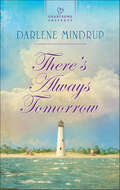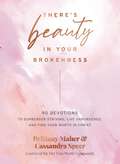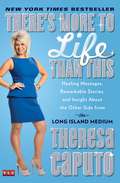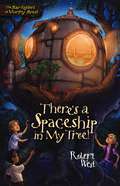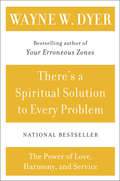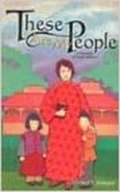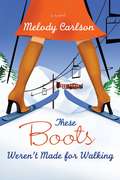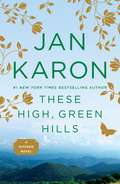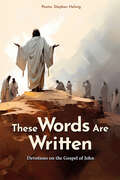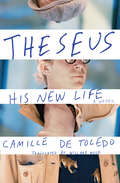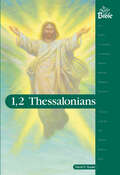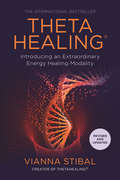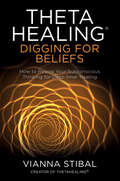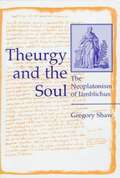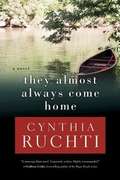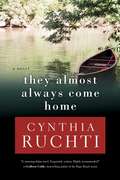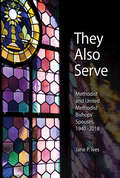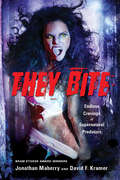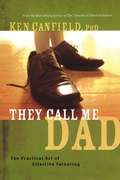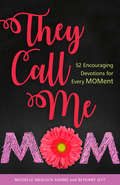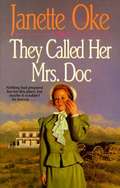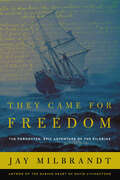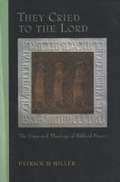- Table View
- List View
There's Always Tomorrow
by Darlene MindrupAdrella always noticed himEveryone took notice of the handsome lighthouse keeper when he visited the mainland. Especially shopkeeper's daughter Adrella Murphy. But the enigmatic man never said a word to anyone. When Adrella is stranded with him on an isolated island during a storm, will she give up her dreams of true love and marry him to save her reputation?As a doctor in the Civil War, Dathan Adams saw too much suffering, and he withdrew from the world to his beloved lighthouse. Now a hurricane forces a spirited Irish lass into his care. To stay alive, he must set aside his solitude and work side by side with Adrella. When her strength and faith erode his defenses, a tragedy might just yield unexpected love.
There's Beauty in Your Brokenness: 90 Devotions to Surrender Striving, Live Unburdened, and Find Your Worth in Christ
by Brittany Maher Cassandra SpeerDo you feel that you're not enough? Do you struggle to see your inherent worth just as you are? In this beautiful full-color devotional, the creators of popular online community Her True Worth offer encouragement through Scripture, story, and art to anchor your identity in Christ and to find rest in His presence.No matter how much we strive or work, it can still seem like it's never enough. But that's okay! Our "enough" ultimately has nothing to do with our actions. Our identity is found in God—and Brittany Maher and Cassandra Speer don't toss that phrase around lightly. As these 90 devotions reveal, realizing your inestimable value in God alone is a life-altering, soul-anchoring truth that will change everything about your life—how you feel about yourself, how you spend your time, and how you treat others.As you walk through the pages of this beautiful devotional, Brittany and Cassandra will kindly guide you back to what God intended for your life, showing you through Scripture, meditations, and reflective questions how sin corrupted God's plan, how Christ redeemed it, and how we can live securely in that redemption today. Each entry speaks the truth that you are:Safe, seen, and lovedAlready enough because of your value in ChristPart of a community of women who understand your longing for soul renewalWhole and complete in Christ, even when you feel fragile or overwhelmedIn a world filled with countless counterfeit identities, it's easy to get caught up chasing the wrong things. These devotions feel like sitting down to coffee with a close friend and sharing both the hard and good of what it means to be a woman following Christ, learning together how to grow and rest in the peace and security Jesus offers. These vulnerable invitations for reflection will help you confidently live out your true worth secure in His promises for you.
There's More to Life Than This: Healing Messages, Remarkable Stories, and Insight About the Other Side from the Long Island Medium (A Gift for Long Island Medium Fans)
by Theresa CaputoFor fans of TLC’s Long Island Medium and anyone interested in the big questions of life, death, and finding out what’s important in between, New York Times bestselling author and medium Theresa Caputo shares how she discovered her gift and her many encounters with Spirit.Beloved medium Theresa Caputo, star of the hit television show Long Island Medium, opens the door to her world and invites you to experience her exceptional gift of communicating with those who’ve crossed over to the Other Side. The always funny, frank, and down-to-earth medium—whether she’s talking to her family, the local butcher, or the souls of those who’ve passed on—began communicating with Spirit at the age of four, but didn’t fully accept her gift until she was thirty-three years old. She had a good life as a busy wife and working mom, but also suffered from chronic anxiety that, as it turned out, came from ignoring her abilities. Once Theresa began channeling, she realized that she felt much better after delivering a message from Spirit and releasing that energy. Since then she’ s used her extraordinary gift to help people heal from the loss of their loved ones. Theresa feels that it’s her purpose to make us all aware that there is more to life than what we see here in the physical world. She wants you to know that your deceased loved ones are safe and at peace, and that they’re now with you in a different way—watching over you, loving you, and assisting you from the Other Side. She also wants you to realize that the unexplainable things you sense and feel from these souls are real, and that it’s healthy and essential to acknowledge them. There’s More to Life Than This lends insight on how Theresa’s mediumship works, what happens to your soul when you die, what Spirit says Heaven is like, what the deceased want you to know, the importance of living a positive life, and the many roles that your family, friends, angels, guides, souls of faith, and God play here and in the afterlife. It also explores how to safely connect with Spirit, so that you can recognize when your loved ones are reaching out. Through Theresa’s personal story, compelling anecdotes, and fascinating client readings, she teaches us about how she communicates with Spirit and helps us to understand and appreciate the important lessons and touching messages that we’re meant to embrace every day.
There's a Spaceship in My Tree!: Episode I (The Star-Fighters of Murphy Street)
by Robert WestKnow Your Star-Fighters Beamer: California transplant to a weird Midwestern town. Feels like he’s living on another planet. Scilla: the gangly tomboy next door. Ghoulie: the class nerd. Add one spaceship-shaped tree house capable of taking them most anywhere in the universe. Hop in and blast off for fantastic outer space adventures in Star-Fighters of Murphy Street—the quirky, funny, fast-paced new trilogy by Robert West. Newly arrived from California, thirteen-year-old Beamer MacIntyre feels like an alien in this bizarre Midwestern town. Strangest of all is the spaceship-shaped tree house in his yard. Surprises await Beamer and his two new friends, Ghoulie and Scilla, when they climb inside and blast off to a universe full of adventure—including a surefire way to make the school bully stop harassing Ghoulie (provided it doesn’t backfire!).
There's a Spiritual Solution to Every Problem
by Wayne W. DyerIn this inspiring new book, bestselling author Wayne W. Dyer puts forth the powerful notion: namely that our ultimate purpose is to fulfill a spiritual destiny. In There's a Spiritual Solution to Every Problem, Dyer shows us that there is an omnipresent spiritual force right at our fingertips that contains the solution to our problems -- from ill health, to financial worries, to relationship difficulties. Drawing from various spiritual traditions, especially from the prayer of St. Francis of Assisi, Dyer helps us unplug from the material world and awaken to the divine with.The first part of the book provides the essential foundations for spiritual problem solving, and explains the basic principles needed to understand and access the world of spirit. In these chapters, you'll read the words of Pantanjali, a Yogi mystic whose teachings and practices deeply affected Dyer and informed his realization that the spiritual force is everywhere.The second half, organized around the prayer of St. Francis of Assisi, contains specific suggestions to help readers put spiritual problem-solving into practice. The prayer embodies the fundamental message of this book. St. Francis's legacy is one of love, harmony, and service -- putting our collective energies toward what we are for instead of what we are against. Each of these last seven chapters begins with a line from this prayer; Dyer then goes on to offer specific and practical suggestions for applying the teaching to everyday problems. These suggestions include affirmations, writing exercises, guided meditations, and other strategies for putting St. Francis's words and the wisdom of this book into practice. Profound and thought-provoking, yet filled with pragmatic advice, There's A Spiritual Solution to Every Problem is a book about self-awareness and tapping the healing energy within all of us. As Dyer writes, "Thinking is the source of problems. Your heart holds the answer to solving them."
Thereby Hangs a Tale
by Penelope WilcockThis is a book of short stories or reflections meant to be shared by faith groups. The stories relate to current issues and are fresh and beautiful.
These Are My People (Booklinks)
by Mildred T HowardGladys Aylward follows God's leading from London to the mountains of China. Grades 2-4.
These Boots Weren't Made for Walking
by Melody CarlsonWilling to make the necessary sacrifices-even skipping the occasional latte-to ensure career success, 31-year-old Cassidy Cantrell "invests" in a chic pair of boots, certain they'll make a spectacular impression and help seal the deal on a long-anticipated promotion from her Seattle employer. But reality tromps all over her expectations. Cassie's job is abruptly eliminated-and her love life obliterated, when her longtime boyfriend dumps her for a "friend." Her self-esteem in tatters, Cassie limps home to the resort town she once so eagerly fled-only to find her recently divorced mother transformed into a gorgeous fifty-something babe with a thriving social life. Cassie wrestles with envy and apathy as she considers the dismal shape of her own physique and romantic prospects. What will it take for her to jump back into life and regain her stride?This sassy and hilarious novel leads readers on a romp through the wilds of relationships, romance, career, and spirituality, revealing that, while God's plans may look drastically different than our own, it'll always be a perfect fit.From the Trade Paperback edition.
These High, Green Hills (A Mitford Novel #3)
by Jan KaronIn These High, Green Hills we're once again in Mitford, a southern village of local characters so heartwarming and hilarious you'll wish you lived right next door. At last, Mitford's rector and lifelong bachelor, Father Tim, has married his talented and vivacious neighbor, Cynthia. Now, of course, they must face love's challenges: new sleeping arrangements for Father Tim's sofa-sized dog, Cynthia's urge to decorate the rectory Italian-villa-style, and the growing pains of the thrown-away boy who's become like a son to the rector. Add a life-changing camping trip, the arrival of the town's first policewoman, and a new computer that requires the patience of a saint, and you know you're in for another engrossing visit to Mitford -- the little town that readers everywhere love to call home.
These Words Are Written: Devotions on the Gospel of John
by Stephen HelwigWhat is the main message of the Bible? Among the great twists and turns of theology lies a life-giving treasure that lights the way for every believer: Jesus is the Christ, the Son of God, and by believing in him, you have life in his name. That's what the central message of the Christian faith is all about—and what the book of John is all about! This unique daily devotional by Pastor Stephen Helwig leads you through the entire book of John verse by verse in clear and simple language, much like the gospel itself. These brief devotions summarize the many doctrinal details of John's gospel with short yet profound statements that provide you with practical takeaways for life. In this book, you'll learn more about who Jesus is, what he has done for you, and the brilliant future awaiting you as you trust in him!
Theseus, His New Life: A Novel
by Camille de ToledoA mesmerizing, poetic autofiction about the quest to find meaning in family tragedies, and a sense of self after loss. In 2012, Theseus heads east in search of a new life, fleeing the painful memories of his past: the suicide of his older brother, the death of his mother, shortly followed by the death of his father. He takes three boxes of archives, leaving everything in disarray, and boards the last night train with his children. He thinks he&’s heading toward the light, toward a reinvention, but the past quickly catches up to him. With a stunning mix of poetry and prose, Camille de Toledo beautifully captures the conflicting urges to look back at or away from our complex histories, made all the more poignant through the scattered contents of Theseus&’s archives—black-and-white photos, fragments of handwritten notes.
Thessalonians (The People's Bible)
by David P KuskeWhat is the book of 1 Thessalonians about in the Bible? What is the book of 2 Thessalonians about in the Bible? Who wrote 1 and 2 Thessalonians?When the apostle Paul left the Thessalonian Christians to share the gospel elsewhere, he feared that these Christians would be overwhelmed by false teachers, persecution, and temptations. He wrote these two letters to encourage them to remain faithful to God’s Word. These letters offer rich hope and remain good reading for Christians faced with challenges to their faith.Want to learn more? If you’re wondering what the books of 1 and 2 Thessalonians are all about, this helpful resource is for you!1, 2 Thessalonians is a reliable Bible commentary. It’s down to earth, clearly written, easy to read and understand, and filled with practical and modern applications to Scripture.It also includes the complete text of the books of 1 and 2 Thessalonians from the NIV Bible. The Christ-centered commentaries following the Scripture sections contain explanations of the text, historical background, illustrations, and archaeological information. 1, 2 Thessalonians is a great resource for personal or group study!This book is a part of The People’s Bible series from Northwestern Publishing House.
ThetaHealing: Introducing an Extraordinary Energy Healing Modality
by Vianna StibalDiscover the worldwide phenomenon of ThetaHealing® and how it can help you to achieve transformational healing in this revised and updated edition of Vianna Stibal's definitive guide.In 1995, Vianna Stibal was diagnosed with a serious health condition. When conventional and alternative medicine failed her, she discovered a simple technique that cured her illness and sparked a worldwide phenomenon.ThetaHealing® is essentially applied quantum physics. Using a theta brain wave, which until now was believed to be accessible only in deep sleep or yogi-level meditation, the practitioner is able to connect with the energy of All That Is - the energy in everything - to identify issues with and witness healings on the physical body, and to identify and change limiting beliefs.In this revised and updated edition, you will discover:- the belief and feeling work that can instantly change the thinking within you that creates illness- the 7 Planes of Existence, a concept that allows you to connect to the highest level of love and energy of All That Is- how to develop the ability to change on all levels: physically, mentally, emotionally and spiritually, using the Creator of All That Is.
ThetaHealing®: How to Rewire Your Subconscious Thinking for Deep Inner Healing
by Vianna StibalNew ThetaHealing® handbook for fans of the ThetaHealing® teachings by best-selling author Vianna Stibal, exploring step-by-step how to Dig for bottom beliefs and rewire your subconscious thinking for deep and transformative healing.In this companion book to ThetaHealing®, Advanced ThetaHealing®, ThetaHealing Diseases and Disorders®, and The Planes of Existence®, bestselling author Vianna Stibal shares an in-depth process to Digging for Beliefs, an integral part of the ThetaHealing® modality.ThetaHealing® is a revolutionary technique developed by Stibal that allows a person to enter into a state of deep meditation, tap into the brain's Theta waves, and activate incredible healing powers. In the pure and divine Theta state of mind, we are able to connect with the Creator of All That Is through focused prayer, access fascinating knowledge and change not only our own lives, but the lives of others. When a Belief has been accepted as real by the mind it becomes crystalized as a "Program" and is placed into the hard-drive of the subconscious, where it acts out those Beliefs, whether or not they are positive or negative. The process of Digging for bottom beliefs in ThetaHealing® enables us to identify those negative Beliefs and rewire our subconscious, receive positive Downloads from the Creator of All That Is, and achieve deep, inner healing. This book provides the student with the necessary tools to achieve this state of divine healing, and is based on Stibal's original teachings. It is an essential book for any student of Theta Healing®.
Theurgy and the Soul
by Robert ShawThis is a philosophically demanding scholarly work about those who remained non-Christian during the last days of the Roman Empire. Many adhered to Plato's philosophy and those of the Roman stoics.
They Almost Always Come Home
by Cynthia RuchtiFinalist - 2011 Carol Award and 2010 RT Book Reviews Reviewers' Choice AwardWhen Libby's husband Greg fails to return from a two-week canoe trip to the Canadian wilderness, the authorities soon write off his disappearance as an unhappy husband's escape from an empty marriage and unrewarding career. Their marriage might have survived if their daughter Lacey hadn't died . . . and if Greg hadn't been responsible. Libby enlists the aid of her wilderness savvy father-in-law and her faith-walking best friend to help her search for clues to her husband's disappearance...if for no other reason than to free her to move on. What the trio discovers in the search upends Libby's presumptions about her husband and rearranges her faith.
They Almost Always Come Home
by Cynthia RuchtiFinalist - 2011 Carol Award and 2010 RT Book Reviews Reviewers' Choice Award When Libby's husband Greg fails to return from a two-week canoe trip to the Canadian wilderness, the authorities soon write off his disappearance as an unhappy husband's escape from an empty marriage and unrewarding career. Their marriage might have survived if their daughter Lacey hadn't died . . . and if Greg hadn't been responsible. Libby enlists the aid of her wilderness savvy father-in-law and her faith-walking best friend to help her search for clues to her husband's disappearance . . . if for no other reason than to free her to move on. What the trio discovers in the search upends Libby's presumptions about her husband and rearranges her faith.
They Also Serve (Tales from Grace Chapel Inn #35)
by Barbara Andrews Pam HansonWarm April showers bring new life to Jane's garden and new opportunities for the ladies of Grace Chapel Inn. Alice agrees to help Vera Humbert chaperone a school field trip to Philadelphia, but keeping track of a lively group of boys teaches her a few lessons of her own. Louise is left in charge of Nine Lives Bookstore and a most unusual helper, and Jane does everything she can to keep their beloved minister from leaving his position at Grace Chapel.
They Also Serve: Methodist and United Methodist Bishops Spouses, 1940-2018
by Jane P. IvesStories from the women and men who have served alongside Methodist and United Methodist bishops.When a bishop is elected in The United Methodist Church, it is not only the one elected who is asked to serve but his or her spouse and family as well. Hear the stories of how Methodist and United Methodist episcopal spouses have adjusted to and navigated this life-changing journey. While dealing with the full range of human experience—births, deaths, relationship struggles, and illness—they also travel the world, participate in mission and ceremonies, meet interesting people, and stand up for justice. Through hardships, celebrations, and everyday struggles, these spouses find their own paths of ministry, answering the calls that are also placed upon their lives. In these ways and many others, they also serve.Praise for They Also ServedA meticulous labor of love by Jane P. Ives, They Also Served remembers faithful unsung Christians by chronicling previously unrecorded details of the spouses of episcopal leaders. Sometimes in the spotlight, often in the shadows, the bishop's spouses struggled to fulfill unpaid roles and undefined responsibilities in the church, usually far from family and friends. Ives empatheticlly highlights how these persons, usually without voice or vote, helped shape the church's mission and ministry.- Dr. Donald E. Messer, Executive Director, Central for Health and Hope: Focusing on Global HIV and AIDS, Centennial Colorado.Bishops may ebb and flow in their popularity based on their decisions, but their spouses are almost universally loved and admired. Jane Ives helps readers understand why that is the case with her comprehensive story of the impressive, diverse, and thoroughly dedicated women and men who have contributed so much to God's work.—Lovett H. Weems, Jr., Distinguished Professor of Church Leadership Emeritus, Wesley Theological Seminary, Washington, DCIn the gospel of Luke, Jesus sent the disciples out, two by two, to every town, and country, every charge and conference. Ives' book records the wisdom of sending two, and restores the names of those often forgotten in the story of the people called "Methodists," the spouses. These are remarkable oral histories as well as timelines of social holiness and global service. This is not a book about survival in ministry and marriage; it's a testimony to those who thrived in their calling. —Heather Murray Elkins, Professor of Worship, Preaching, and the Arts, The Theological School of Drew University, Madison, New JerseyThis is a book about discipleship. It is also a book about ministry and itinerancy.It tells stories of how God sometimes calls two people to the work of episcopacy, people who happen to be married to each other. It is a book that will make you laugh and cry!This book is an important addition to the literature of Methodist episcopacy. And it is a hard book to put down!—William Boyd Grove, Bishop (Ret.) of The United Methodist ChurchJane Ives has given the Methodist family a priceless treasure. Through an astonishing effort to collect memories and explore archival material, she has compiled a comprehensive record of episcopal spouses, their stories, accomplishments, and contributions to the church. But this book is more than a biographical dictionary. It offers a poignant, insightful account of the lives of bishops, their spouses and families, and the impact of the church's expectations on all of them. As a little boy, I knew firsthand the phone call: get on a train to New Orleans with your sister; your Daddy is going to be a bishop. Allow me to testify, then, that this book is the real deal -- genuine, human, and rich with faith and Spirit.—Thomas E. Frank, Associate Dean for Continuing Studies, Graduate School of Arts and Science, Wake Forest University, Winston-Salem, North CarolinaLaity and clergy active in United Methodist life and their spouses will want to immerse themselves in this "corporate" autobiography, which provides an overview of Methodism through almost 80 years of personal experiences and cultural change. Jane Ives, a
They Bite
by Jonathan Maberry David F. KramerFrom the shadowy worlds of myth and legend. . . From the pages of bestsellers and the silver screen. . . Theyre searching for you. And theyre hungry. Every culture and country has its demons--and since earliest times weve tried to capture these supernatural predators through the power of storytelling. But they refuse to be tamed. . . Join Bram Stoker Award winners Maberry and Kramer on a chilling journey into the nature of the beast. This compendium of creepy creatures tracks the monsters of our imagination from the whispered fireside tales of old to the books, comics, and films that keep us shivering on the edges of our seats with delight and fascination. Biting commentaries by the modern masters of the macabre--John Carpenter, Peter Straub, Jack Ketchum, Holly Black, Kevin J. Anderson, Ray Garton, Ramsey Campbell, Christopher Golden, Kelley Armstrong, Simon Clark, Herschell Gordon Lewis, and dozens of others--help make this the ultimate guidebook to the horrific roots and modern-day expressions of our darkest fears. With 8 pages of color illustrations by leading artists of the supernatural
They Call Me Dad
by Ken CanfieldDeveloped from years of research and shaped by a biblical world view, They Call Me Dad is a powerful exposé of the spiritual insights of effective fathering. Dr. Canfield encourages fathers to activate their faith through modeling and teaching children to out-think, out-live, and out-love the world. They Call Me Dad contains interactive and profiling tools which enhance a dad's skill and understanding of his role as a father.
They Call me Mom: 52 Encouraging Devotions for Every Moment
by Michelle Medlock Adams Bethany JettMoving, funny devotions crafted for every day by moms who know the drillWhen women take on the role of mom, they take on a hundred other titles as well: healer, comforter, chef, teacher, cheerleader--and less flattering jobs such as disciplinarian, ruiner of fun times, and chief worrier. In the middle of juggling all those roles, finding room to spend time alone seeking God can seem insurmountable.Moms Michelle Medlock Adams and Bethany Jett understand the struggles--and the joys. They've pulled together their own experiences with the crazy world of parenting as well as the most requested, most talked about topics on mommy blogs. Their research nailed down what moms really want to talk about.They Call Me Mom is a lighthearted, transparent take on the real-life ups and downs mothers face through all stages of parenting. Whether mom just brought home her first baby or she has several kids and zero time, she'll find relatable words and helpful encouragement in these pages. And with one devotion for every week of the year, it's easy to fit in a few minutes with God in the middle of a full parenting life.
They Called Her Mrs. Doc (Women of the West #5)
by Janette OkeWhile drinking tea and watching life pass from her front porch, during a break from packing to move to the city, Cassie remembers her life, from her girlhood days with her best friend to her marriage, her move to a new location, the births of her children and theirs after them, and traumas that tried her faith, but left her strong.
They Came for Freedom: The Forgotten, Epic Adventure of the Pilgrims
by Jay MilbrandtA page-turning story of the Pilgrims, the courageous band of freedom-seekers who set out for a new life for themselves and forever changed the course of history.Once a year at Thanksgiving, we encounter Pilgrims as folksy people in funny hats before promptly forgetting them. In the centuries since America began, the Pilgrims have been relegated to folklore and children&’s stories, fairy-tale mascots for holiday parties and greeting cards.The true story of the Pilgrim Fathers could not be more different. Beginning with the execution of two pastors deviating from the Elizabethan Church of England, the Pilgrims&’ great journey was one of courageous faith, daring escape, and tenuous survival. Theirs is the story of refugees who fled intense religious persecution; of dreamers who voyaged the Atlantic and into the unknown when all other attempts had led to near-certain death; of survivors who struggled with newfound freedom. Loneliness led to starvation, tension gave way to war with natives, and suspicion broke the back of the very freedom they endeavored to achieve.Despite the pain and turmoil of this high stakes triumph, the Pilgrim Fathers built the cornerstone for a nation dedicated to faith, freedom, and thankfulness. This is the epic story of the Pilgrims, an adventure that laid the bedrock for the Founding Fathers, the Constitution, and the American identity.
They Cried to the Lord: The Form and Theology of Biblical Prayer
by Patrick D. MillerThe book introduces biblical prayer in all its varied forms and from different angles: the prayers of Israel's neighbors, the names of God in prayer, prayers for help, the response of God, praise, the prayers of women, confession and penitence, prayers for others, blessing and curse, and Jesus and Paul at prayer.
